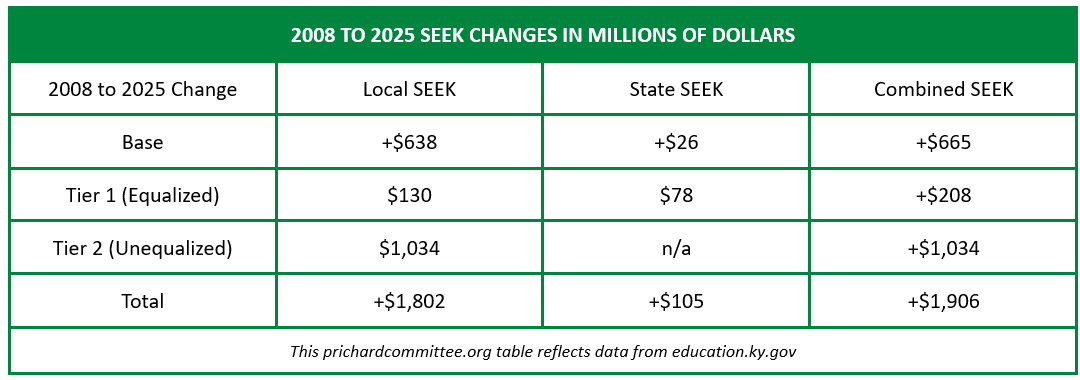Earlier this week in Frankfort, Senator Danny Carroll filed Senate Bill 203, also dubbed the Horizon Act.
With it comes a proposed Senate budget request of $150 million per year, or $300 million for the biennium. This is the most significant proposed state investment in early childhood education to date and brings us closer to the Prichard Committee’s Big Bold Ask for the early care and education sector. The Horizon Act’s provisions are partly aimed at addressing the projected further destabilization of an already Fragile Ecosystem of early care and education because of the funding cliff upon the expiration of pandemic-era federal Child Care Development Block Grant (CCDBG) dollars. But they do so much more.
Senator Carroll’s bill is premised on three key ideas:
1. Education begins at birth.
The Horizon Act seeks to establish a Foundations for Early Learning Fund ($73.125 million per year) that will provide a modest per-student allocation to licensed and certified early care and education providers who apply, based on their enrollment. Providers must participate in the Kentucky ALL STARS Quality Improvement Rating System to be eligible for these funds, which can be used for personnel or fixed expenses. With this proposal, the bill sponsor makes a strong statement about early childhood education as encompassing the critical first years of a birth-to-12 education system.
SB 203 also proposes an appropriation of close to $72 million per year for child care investments, including CCAP (Child Care Assistance Program) subsidies for families at 85% of State Median Income (SMI), provider reimbursement at 80th percentile of the Market Rate Survey, provider payments for enrollment versus attendance, the continuation of income exclusion benefits for children of child care providers, support for working families transitioning out of CCAP eligibility, and to cover the cost of federal background checks. SB 203 continues support for early childhood education professional scholarships and the Employee Child Care Assistance Partnership (ECCAP) program. SB 203 also proposes start-up grants for home-based and center-based providers to generate new early childhood education slots. These proposed early childhood policy and investment improvements are a major step forward on the Prichard Committee’s Big Bold Ask priorities.
2. The early childhood education profession is critical to secure and grow Kentucky’s workforce.
SB 203 proposes to rename the Division of Child Care as the Division of Early Childhood Education, and the Division of Regulated Child Care as the Division of Regulated Early Childhood Education. These changes pave the way towards a future where the words ‘daycare’ and ‘childcare’ are no longer the norm, and a unified governance structure oversees and supports the entire early childhood education ecosystem.
SB 203 also proposes the establishment of an associate degree in Interdisciplinary Early Childhood Education (IECE) Entrepreneurship within the KCTCS (Kentucky Community and Technical College System) system, which bolsters the early childhood education professional pathway as a stackable component along with the Commonwealth Child Care Credential, the Child Development Associate (CDA) certificate, the Early Childhood Director Credential, the Infant and Toddler Credential, the School-Age Credential, and the bachelor’s degree in IECE.
The Horizon Act also proposes the inclusion of Early Childhood Education in the Work Ready Kentucky Scholarship Program and does not disqualify early childhood professionals with an associate or higher degree from eligibility to participate.
3. Early childhood education partnerships are key to the early childhood sector’s future.
A creative component of SB 203 is the proposed establishment of the Innovations in Early Childhood Education Delivery Fund ($5 million per year) to provide matching funds (up to $100,000 per year) to eligible applicants interested in increasing the availability and/or expanding the duration of early childhood education services in their communities. The goal of this fund is to entice entities outside of traditional private early care and education providers, such as for-profit and non-profit entities, public schools, local governments, and higher education institutions, to engage in innovative delivery models. It also incentivizes public-private partnerships with matching funds up to $125,000 a year.
In a press conference on Tuesday, Senator Carroll indicated that every child in the Commonwealth deserves access to high quality care and education. The Horizon Act moves our state in the direction of an early childhood system that includes all possible delivery models, and more than just the public schools as proposed in Governor Beshear’s budget.
The Prichard Committee has long been an advocate for early childhood education partnerships between privately and publicly funded entities as a key component of high-quality early care and education. We applaud Senator Carroll’s leadership in forging a path towards this end.
Jennifer Washburn, Strong Start Kentucky Coalition and Prichard Committee member and owner/director of the NAEYC-accredited 5-Star iKids Childhood Enrichment Center in Benton, Kentucky, spoke about what the Horizon Act will mean for early education providers such as herself, and for Kentucky’s working families and their children, who are faced with higher tuition rates, lack of early childhood educators due to teacher pay cuts, and worsening of the child care desert status of communities due to the closing of centers. “The Horizon Act is an exceptional starting point to address the needs of a broken system. The Horizon Act gives hope that real change is on the horizon for Kentucky’s youngest citizens and their families.”













